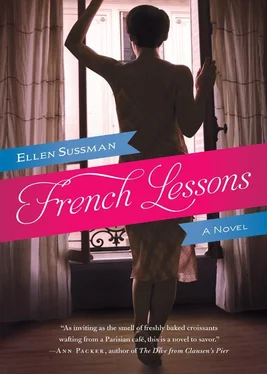“I met a girl at summer camp. I was thirteen. She was sixteen and much, much taller than I, with hair that fell to her waist. She wore it in one long braid that lay on her back like a thick rope. She was a swimmer and I would watch her race across our New Hampshire lake, and I thought she was the most beautiful girl in the world.”
“Was it love? Or-” Chantal says the words: “avoir le béguin pour quelqu’un.”
“What does that mean?” he asks.
“When you yearn for someone. They’re unattainable. But you can’t get them out of your mind.”
“A crush,” Jeremy translates. “So when does a crush become love? When you attain this girl?”
Chantal shakes her head with a sly smile on her face. “One should never attain the object of a crush.”
“Why not?”
“You will be disappointed. A crush is about desire. It’s not about love.”
“But how do you know until you’ve tried?” Jeremy asks.
The bride and bridegroom lean toward each other and when their lips touch, the photographer snaps a photo and the flower girl giggles.
“I know a place for our picnic,” Chantal says.
They walk along the Seine, leaving the photo shoot behind. Jeremy tells her his story.
“One day, toward the end of the summer, a girl came up to me and told me that Sarah liked me. Sarah, the object of my affection. I was out of my mind with excitement. I planned to kiss her that night. I wouldn’t talk about it with the other boys in my bunk who boasted about their meager fumblings in the dark-this was love of a higher order. I had waited for weeks, watching her, learning her every stroke. I knew how many twists on her braid, I noticed when a new bathing suit didn’t match up with her tan line.”
“A romantic,” Chantal says.
“A fool,” Jeremy tells her.
“We’re almost there,” Chantal says.
The stone walkway follows the edge of the Seine. Their bags bump against their legs as they walk. Chantal’s pace quickens. This is not the way they usually stroll-slowly, effortlessly, meandering around corners. He lengthens his stride to keep up.
The river is high from days of summer rain. Someone at dinner last night said that there was a threat of flooding, and the conversation turned to Hurricane Katrina. At home, Jeremy had been quick to accuse the Bush administration of doing everything wrong, but here, among Europeans, he is oddly defensive. He found himself arguing that it is impossible to protect a city built below sea level, and he thought to himself, even as the words slipped from his mouth: What am I saying? Do I even believe this?
Later, on the walk home, before the fight, he told Dana, “I’m not sure what that was all about. With these foreigners I find myself rethinking everything I took for granted.”
“In Paris, it’s still embarrassing to be an American,” she said.
“That’s not it,” Jeremy said. “I mean, I was thinking about it in a brand-new way. What I said made sense to me. I wasn’t just making excuses.”
She wrapped her arm around his waist and pressed her head into his shoulder. “I’m tired,” she said. “Sometimes it’s hard to be so sure of myself all the time.”
“You?” he said, and kissed the top of her head.
“Especially me,” she told him.
The water of the Seine licks the side of this low road. Jeremy doesn’t see anything ahead that might provide a spot for a picnic, if that’s what Chantal is looking for. Halfway across the river, on the Île Saint-Louis, long stretches of riverbank provide sunbathers a place to stretch out. Jeremy glances at the darkening sky. He imagines the almost naked boys who are lying on the grass at the edge of the island running for cover in a thunderous moment.
But Chantal is not headed for the bridge, which is on the higher road. And Jeremy doesn’t ask her plan-that has been one of the delights of his days with Chantal. He gives it all up to her. She leads the way in conversation and in their peregrinations through the city. So why is he feeling anxious all of a sudden? It’s not as if they’re lost. It’s impossible to imagine that they’ve run out of things to talk about or sights to see.
But there’s nothing ahead, just a long stretch of road. They walk, quickly, Chantal’s low heels clicking on the cobblestones.
Jeremy remembers the story he was telling-the girl at summer camp-and feels a rush of relief. They are in the middle of a conversation. He can find his way back after all.
“That night, at camp-” he says, but Chantal interrupts him, something she never does.
“Wait a moment,” she tells him. “We’re almost there. Save your wonderful story.”
Jeremy worries-it is not a wonderful story. It is barely a story at all. The girl didn’t show up, the other girls teased him, and he avoided the lake for the rest of the summer. Why did he choose to tell this story at all? First love? He could have talked about Dana, because of course, even though there were plenty of girlfriends along the way, she was the first to claim his heart.
“Nous sommes arrivés,” Chantal says proudly. Here we are.
She has stopped walking and stands there, her arms open. Jeremy looks around. There is no patch of grass, no tree to sit beneath, nothing that bears noticing.
Until Chantal steps toward the river and then keeps going, down a few steep stairs and onto a short plank. Une péniche! She is leading him onto one of the many old boats that are moored along the river. This one in particular is badly in need of painting, though it was once a bold red, with the words JARDIN BLEU painted in yellow on the side. It’s not as long as many of the other boats-maybe forty feet-and it looks like it hasn’t budged from its spot in years.
Jeremy glances up and down the long stretch of boats and sees immediately what makes this boat different-it is a garden! The deck is covered with potted plants and flowers and ferns, bursting with them, in fact. Flowering tendrils spill over the sides of the boat and hang down, sometimes dropping as low as the water. And a deep, lush jungle smell rushes at him-there’s something wild and untamed here.
Chantal is already stepping onto the boat, her long, lean legs easily maneuvering the gap from the quai to the boat. She leans back and gives him a hand. He takes it, though of course he could make this step without her help. The bags on her arm bump against each other and she says, “Let me put these down. Come in. Welcome to my home.”
Her home.
He stands with his feet firmly planted on the boat’s deck and feels a momentary shift-of course, they’re on water-and the boat rolls as a bateau-mouche goes by. He catches himself with a hand on the rail. Chantal reaches out her hands and he’s confused until he remembers his packages, draped over shoulders and forearms. He unloads them into her hands.
“Please. Take a seat on the deck. I’ll be right there.” She gestures with a tilt of her head to the back of the boat.
He sees a table and two chairs in the middle of the garden. The table sits under a trellis; wisteria, in full bloom, drapes the wood, cascading down. Jeremy has never seen anything like this before. He must say something, but when he looks back, Chantal is gone. He sees the back of her head as she descends some steps into the belly of the boat.
Again the boat rocks; again Jeremy grabs the rail and widens his stance. I need sea legs, he thinks.
He walks back to the table and chairs, winding through the pots of flowering bushes and exotic ferns. Everything is newly watered from the storm, and the smell of damp earth fills the air.
Chantal’s home. Jeremy could have imagined many places where she might have lived-a chambre de bonne near the Eiffel Tower, a small apartment on the Left Bank, maybe even a loft in the Marais-but this is beyond his imaginings. And yet it is perfect. That is what it is like to learn someone, he thinks. You know many things about them, and then one new bit of information takes all the knowledge you’ve gained and shifts it so completely that you begin again.
Читать дальше












